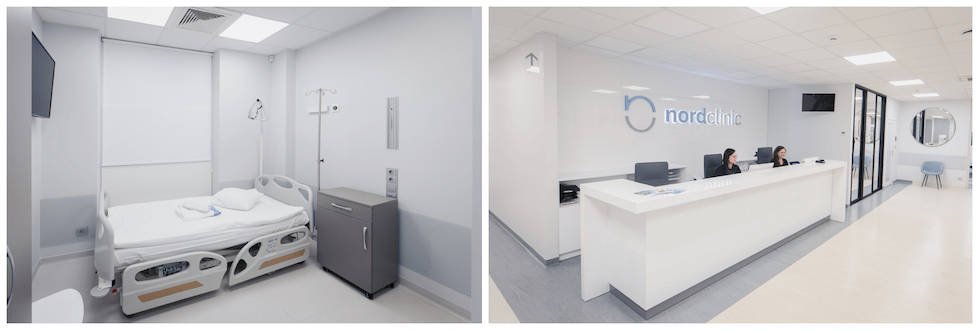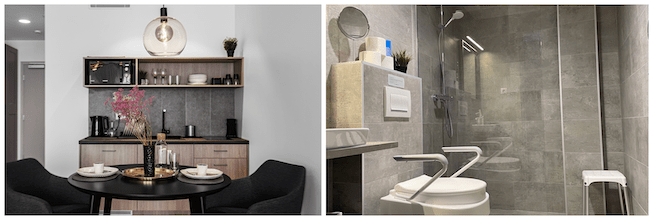Hemorrhoidectomy
Leading medical tourism clinic
We are the leading medical tourism clinic in the Baltic region with over 10 years of experience. We are proud of the fact that around 90% of our patients come from abroad: the UK, Ireland and Scandinavian countries – this is the area we specialise in and our processes have been adapted to cater specifically for patients from abroad. Our team of surgeons perform over 4.000 surgeries per year, mostly plastic, bariatric, orthopaedic, general and gynecological surgeries.
Reviews and Facebook group
Our patients and surgeons in the media
Prices
- Hemorrhoid removal surgery (hemorrhoidectomy) – from 1.420 £ | or 840 £ with S2 funding*
*Your surgery can be partly funded via the S2 funding route (read more in the next tab)
- accommodation with medical care – from 62 £ per night
The S2 route may entitle you to NHS funding for planned state healthcare treatment in Lithuania. You can save up to 80% for the hernia surgery. Contact our customer service for more information:
- Hemorrhoid removal surgery (hemorrhoidectomy):
- from 1.420 £ without S2 funding
- from 840 £ with S2 funding
Get your surgery for free by claiming a refund from your local health board. We cooperate with HSE and other health boards across the EU to help our Irish and EU patients receive a refund for their weight loss surgery in Lithuania. The clinic helps with the documents needed to claim a refund after following the EU directive route for medical treatment abroad.
Regular price:
- consultation with the surgeon and anaesthesiologist
- all the necessary health tests before and after the surgery
- surgery
- anaesthesia
- hospital stay (1-3 days) with 24 hours medical care
- 24/7 personal assistance during your stay
- transfers to / from the airport, hotel and clinic
Please note that the price of the surgery itself is provisional and may be accurately assessed only after the evaluation of each individual case.
The default currency at our clinic is EUR, so if you were looking at prices in GBP it may vary depending on GBP / EUR exchange rate at the moment of payment.
- Hemorrhoid removal surgery (hemorrhoidectomy) – from 1.700 € | or 1.000 € with S2 funding*
- accommodation with medical care – from 74 € per night
The S2 route may entitle you to NHS funding for planned state healthcare treatment in Lithuania. You can save up to 80% for the hernia surgery. Contact our customer service for more information:
- Hemorrhoid removal surgery (hemorrhoidectomy):
- from 1.700 € without S2 funding
- from 1.000 € with S2 funding
Get your surgery for free by claiming a refund from your local health board. We cooperate with HSE and other health boards across the EU to help our Irish and EU patients receive a refund for their weight loss surgery in Lithuania. The clinic helps with the documents needed to claim a refund after following the EU directive route for medical treatment abroad.
Regular price:
- consultation with the surgeon and anaesthesiologist
- all the necessary health tests before and after the surgery
- surgery
- anaesthesia
- hospital stay (1-3 days) with 24 hours medical care
- 24/7 personal assistance during your stay
- transfers to / from the airport, hotel and clinic
Please note that the price of the surgery itself is provisional and may be accurately assessed only after the evaluation of each individual case.
The default currency at our clinic is EUR, so if you were looking at prices in GBP it may vary depending on GBP / EUR exchange rate at the moment of payment.
Patient stories

Get your surgery for free by claiming a refund from your local health board. The clinic helps patients with the documents needed to claim a refund after following the EU directive route for medical treatment abroad. It applies to patients who are insured under the systems of one of the EU countries and may not get the surgery due to long waiting times. On average our patients from the EU countries get fully refunded by their local health board in 3-5 months after their surgeries.
Our surgeon
- Our surgeon Zigmantas Urniezius
- Has more than 20 years of experience
- Performs hemorrhoid surgeries
- Member of the Lithuania’s Society of Surgeons
11 reasons that make us the most popular bariatric clinic abroad
Our team of 3 bariatric surgeons has 15-20 years of experience in the field in total performing over 500 different bariatric surgeries per year. Moreover, our surgeons are members of various prestigious surgical societies both Lithuanian and international. Our leading bariatric surgeon Dr Almantas Maleckas has performed more than 7.000 bariatric surgeries. He is fluent in four languages, among which English and Swedish. The surgeon has been regularly working in Sweden for over 15 years. Dr Maleckas is a pioneer of laparoscopic surgery in Eastern Europe and has trained many other bariatric surgeons in the region.
We are one of the leading bariatric surgery clinics for medical tourists in the European Union. We are proud of the fact that over 90 % of our patients come from the UK, Ireland, Norway, Sweden, Denmark, Germany, Switzerland and other countries.
We are trusted by our patients and we appreciate all the reviews and feedback collected over the years. Find testimonials here or on Google.
Already more than 5.000 of our former, current and future patients joined our online community with the aim to build a space for opinions and mutual support. Members are welcome to share experiences about their visit to the clinic and to discuss all surgery-related matters.
We offer a 5-year follow-up which includes being able to get in touch with our Lithuanian dietitian Karolina. She is consulting patients after surgery and is available upon request to answer postoperative nutritional questions for five years after surgery.
Our clinic is the only clinic that has developed its own app designed specifically for bariatric patients – Bariatric IQ. The most useful feature of this app is special bariatric diet recommendations based on a particular product, a patient’s gender, time after surgery and other factors. Such a feature has not been replicated by any other bariatric apps in the world. Read more and download the app on your IOS or Android smartphone here.
Our clinic works according to the highest standards set by the European Union. This helps to guarantee the quality of medical services. We care about the safety, comfort and successful results of our patients from all over the world.
The clinic helps patients with the documents needed to claim a refund after following the EU directive route for medical treatment abroad. It applies to patients who are insured under the systems of one of the EU countries and may not get the surgery due to long waiting times.
We provide customer service in 9 foreign languages including English, Swedish, Norwegian, Danish, Italian, Spanish, French, Russian, Polish. Everyone in our clinic speaks English, including nurses, assistants and the surgeon.
Combining different plastic surgery procedures to offer optimal treatment for post-bariatric patients has been our plastic surgery department’s specialisation for many years now. We have performed such surgeries for more than 10.000 patients to this date. Since weight loss patients often require multiple surgical procedures to address excess skin, surgery planning and surgeons’ experience are very important. We carefully select patients, evaluate each case individually, and only agree to combine surgeries within health & safety limits. Our team of 9 plastic surgeons performs more than 3.000 plastic operations a year, a number that no other clinic in Central & Eastern Europe can match.
Direct flights to Lithuania







Our clinic

Self-catered accommodation with medical care
What are hemorrhoids? What types of hemorrhoids exist?
Hemorrhoids, also called piles, are formed by swollen veins that create lumps in the anal area. A complex vein network regulates bowel movements and maintains blood flow. Hemorrhoids form when the pressure in the veins increases, leading to swelling and inflammation. They can be itchy, painful, sensitive, and also cause bleeding which is one of the clearest signs of hemorrhoids. Sometimes hemorrhoids resolve on their own lasting about 2 to 3 weeks. However, surgery is required in about 10% of cases to provide permanent treatment. There are a few types of hemorrhoids:
They are found inside the rectum and they usually don’t cause pain but tend to bleed. This type of hemorrhoids can present with a smear of bright red blood.
This is a severe form of internal hemorrhoids that have pushed through the anus.
These are small hard lumps under the skin around the anus.
What can cause hemorrhoid problems?
Hemorrhoids are swollen veins that develop from increased abdominal pressure due to pregnancy, straining during bowel movements, heavy manual labor, sitting for long periods of time, chronic diarrhea, constipation, obesity, low-fiber diet, or genetic factors.
Symptoms of hemorrhoids
Hemorrhoids usually present with such symptoms:
- Bleeding – patients notice bright red streaks of blood visible on toilet paper or stool;
- Anemia – a symptom that results from chronic bleeding;
- Lumps – sensitive and painful lumps near, around, or inside the anus;
- Protrusion – when hemorrhoids gradually enlarge they protrude from the anal opening;
- Mucoid discharge – it is usually present in prolapsing hemorrhoids;
- Irritation of perianal skin – damage to the skin is caused by mucoid discharge;
- Pain – it is an unusual symptom that only occurs when there is significant inflammation and thrombosis.
Who is a proper candidate for hemorrhoid surgery?
Hemorrhoid surgery is recommended for those individuals who have tried non-surgical treatments like changing their diet, topical creams, or sitz baths (soaking perineum in water with medical salt). Generally, surgery is a good choice for patients with good general health. Some health conditions do not allow for hemorrhoid surgery, such as pregnancy, blood clotting disorders, local infections, and certain medications (e.g., blood thinners). Patients with severe medical conditions, such as heart, lung, and liver disease, are not good candidates for this type of surgery.
When is the surgery necessary? What can be alternative options?
Hemorrhoid surgery, also called hemorrhoidectomy, is a surgery to remove the enlarged and inflamed veins in the rectum or anus. It is the last option when the non-surgical treatments have failed to provide significant relief. Hemorrhoidectomy is necessary in the following cases:
- Chronic hemorrhoids that keep recurring despite the conservative treatment methods;
- Prolapsed hemorrhoids that protrude through the anus;
- Thrombosed hemorrhoids, which occur when a blood clot forms obstruct the vein, causing severe swelling and pain;
- Large hemorrhoids that make bowel movements painful and sometimes even cause bleeding, causing anemia and anal sphincter damage.
There are alternative options to hemorrhoidectomy, for example:
It is a procedure in which a rubber band is placed at the base of the enlarged vein, cutting off its blood supply and causing it to fall off.
This procedure involves injecting a type of medicine into the hemorrhoid, causing it to shrink. This method is better applied for smaller hemorrhoids.
This treatment is a minimally invasive procedure, usually performed in a doctor’s office, using heat to shrink the hemorrhoids;
It is a new treatment that uses a laser to remove the hemorrhoids;
It is a procedure in which a doctor uses a circular stapler, a special instrument that goes inside the anus and removes abnormally enlarged hemorrhoidal tissue.
Preparation for surgery
The initial consultation is for a physical examination. The patient is asked to lie down on a side with the knees bent at 90 degrees. Then, the doctor performs a digital examination and anoscopic evaluation. A digital rectal exam is a test that a doctor uses to examine a person’s lower rectum with a lubricated and gloved finger, while an anoscopy is an examination method using a small instrument called an anal speculum. After a physical examination, the surgeon discusses possible types of treatment and helps the patient to decide on the preferred option.
In some cases, it may be necessary to discontinue certain drugs, like blood-thinning medications, for a period of time. Patients must stop smoking and consuming alcohol a month before and after the surgery to reduce the risk of complications.
How is the surgery performed?
Hemorrhoidectomy is performed under general anaesthesia. A patient is positioned in a lithotomy position (lying on the back with legs in foot holders). A surgeon makes an incision around the anus and removes the enlarged hemorrhoidal tissue. Once the surgery is over, the surgeon closes the incisions with stitches or sutures, a gauze is placed inside the anus to prevent bleeding post-surgery.
Recovery after hemorrhoid surgery. Will I have pain after the operation? Will I have a scar?
Recovery varies from person to person, however, most patients can expect pain and itching in the anal area for 2-4 weeks post-op. Pain can be controlled with over-the-counter medications and there are special creams to reduce itching. Some patients also experience constipation, or difficulty urinating. Scarring is usually minimal and fades over time. For the first few days, patients should limit strenuous activities, like lifting, bending, squatting, and sitting down.
Possible complications
Hemorrhoidectomy is usually a well-tolerated surgery. However, some of the possible complications include bleeding, infection, and urinary retention. Some of the difficult and rare complications are pelvic sepsis, fecal incontinence, anal stenosis, and chronic pelvic pain. Patients should cooperate with the medical team and follow all the pre-operative and post-operative instructions to lower surgical risks and prevent complications.
Send us your enquiry







